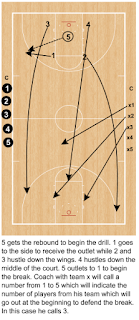Breaking Down Cliques: How Coaches Build True Team Chemistry
Every basketball team has personalities, friendships, and small circles — that’s normal. But when cliques start to divide the locker room, they can quietly destroy communication, trust, and team chemistry. The best coaches don’t ignore it — they build unity intentionally.
Here’s how to take control of your culture and make sure your team plays — and grows — as one.
1. Set a Team-First Standard
From the first practice, establish who you are as a team:
“On this team, everyone matters. Everyone contributes.”
When respect and inclusion are non-negotiable, cliques lose their power.
Encourage players to reach outside their friend group — sit with someone new, share a drill partner, or support a quieter teammate.
Tip: Make “We Over Me” part of your team’s daily language.
2. Mix It Up
Don’t let comfort zones define the roster.
-
Rotate practice groups and warm-up lines weekly.
-
Pair leaders with younger players.
-
Host off-court challenges, dinners, or service projects with randomly assigned teams.
When players interact outside their normal groups, they start to see teammates — not just friends.
3. Give Everyone a Voice
Cliques fade when everyone feels seen and valued.
End practices with player shoutouts — let teammates recognize effort, hustle, or positive energy.
It builds mutual respect and reminds everyone: we’re all in this together.
“Inclusion builds confidence — and confidence builds chemistry.”
4. Lead by Example
Players follow what you model.
If you only connect with certain players, they’ll do the same.
Show consistent attention, fairness, and energy across the whole roster. Greet everyone. Encourage everyone.
Your tone sets the emotional temperature of the team.
“If the coach connects with everyone, the team will too.”
5. Reinforce One Identity
Keep your team mantra front and center — “All In,” “One Heartbeat,” “Together Tougher.”
Make it more than words on a shirt. Live it through practice habits, accountability, and the way you celebrate team success.
When players buy into one identity, the culture becomes stronger than any clique.
Final Thought
You’ll never stop friendships — and you shouldn’t. But as a coach, you can shape the environment so that every player feels like they belong.
A united team plays freer, fights harder, and trusts deeper.
“A connected team beats a talented team — every time.”



Comments
Post a Comment